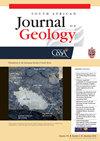南非大塞德伯格-法尔兹湾大型火成岩省:与南大西洋断裂有关的广泛岩浆活动的南部节点
IF 1.2
4区 地球科学
Q2 GEOLOGY
引用次数: 0
摘要
在南非西部发现了一个新的 130 至 140 Ma 的岩浆岩堤群。它包括以前未确定年代的塞德伯格堤坝群(Cederberg dyke swarm,CDS),我们报告了该堤坝群的 U-Pb ID-TIMS 巴德雷石年代:131.4 ± 4.5 Ma(Knersvlake 子群)和 133.0 ± 1.5 Ma(Doring-Tanqua 子群)。这两个样品的 40Ar/39Ar 时间以及 Doring-Tanqua 子群的另外两个时间在 128.5 ± 1.4 Ma 和 132.2 ± 1.5 Ma 之间。我们还报告了位于 Kleinsee 以南 27 公里处的东西向堤坝的 40Ar/39Ar 年龄:139.3 ± 3.5 Ma,以及 Garies 附近东西向堤坝的 140.3 ± 1.2 Ma。这八个年代加在一起,有力地证明了大塞德伯格-福尔斯湾堤坝群(GCFDS)北部的形成年代约为 130-140 Ma。130 至 140 Ma。本文报告的痕量元素和稀土元素数据表明,这些堤坝的成分是E-MORB玄武岩,经过俯冲改造的岩石圈地幔或大陆地壳的改造,或两者的结合,在岩石成因上类似于约132 Ma的福尔斯湾堤坝群。132 Ma的开普敦周围的福尔湾堤坝相似。因此,我们建议将所有这些共生且成分相似的堤坝统一为一个大火成岩省(LIP),称为大塞德伯格-福尔斯湾大火成岩省(GCF-LIP)。本文章由计算机程序翻译,如有差异,请以英文原文为准。
The Greater Cederberg–False Bay Large Igneous Province in South Africa: A southern node of widespread magmatism associated with South Atlantic rifting
A new 130 to 140 Ma mafic dyke swarm, is identified in western South Africa. It consists of the previously undated Cederberg dyke swarm (CDS), for which we report U-Pb ID-TIMS baddeleyite ages of 131.4 ± 4.5 Ma (Knersvlake subswarm) and 133.0 ± 1.5 Ma (Doring-Tanqua subswarm). 40Ar/39Ar dates on these two samples and two additional dates of the Doring – Tanqua subswarm cluster between 128.5 ± 1.4 Ma and 132.2 ± 1.5 Ma. We also report 40Ar/39Ar ages of 139.3 ± 3.5 Ma for an east-west trending dyke located further north: 27 km south of Kleinsee, and 140.3 ± 1.2 Ma for an east-west dyke near Garies. Together, these eight ages robustly date the emplacement of the northern part of a Greater Cederberg-False Bay Dyke Swarm (GCFDS) at ca. 130 to 140 Ma. Trace and rare earth element datareported herein suggest these dykes are compositionally E-MORB basalts that underwent modification either via subduction-modified lithospheric mantle, or by continental crust, or a combination thereof, and are petrogenetically similar to the ca. 132 Ma False Bay dykes around Cape Town. Therefore, we propose to unify all these coeval and compositionally similar dykes into one large igneous province (LIP) termed the Greater Cederberg-False Bay Large Igneous Province (GCF-LIP).
求助全文
通过发布文献求助,成功后即可免费获取论文全文。
去求助
来源期刊
CiteScore
3.60
自引率
5.60%
发文量
18
审稿时长
>12 weeks
期刊介绍:
The South African Journal of Geology publishes scientific papers, notes, stratigraphic descriptions and discussions in the broadly defined fields of geoscience that are related directly or indirectly to the geology of Africa. Contributions relevant to former supercontinental entities such as Gondwana and Rodinia are also welcome as are topical studies on any geoscience-related discipline. Review papers are welcome as long as they represent original, new syntheses. Special issues are also encouraged but terms for these must be negotiated with the Editors.

 求助内容:
求助内容: 应助结果提醒方式:
应助结果提醒方式:


